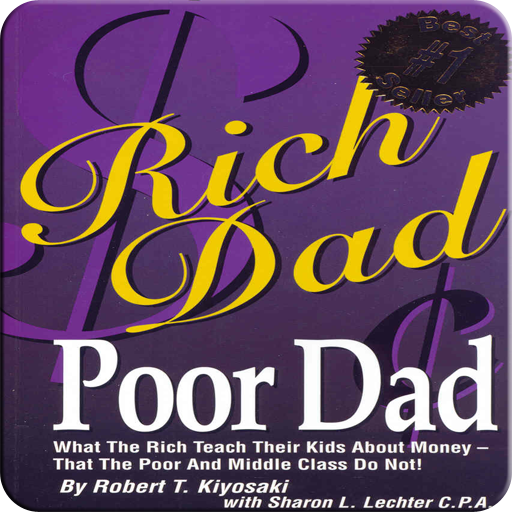“No, it doesn’t. Let me finish the other emotion, which is desire. Some call it greed, but I prefer desire. It’s perfectly normal to desire something better, prettier, more fun, or exciting. So people also work for money because of desire. They desire money for the joy they think it can buy. But the joy that money brings is often short-lived, and they soon need more money for more joy, more pleasure, more comfort, and more security. So they keep working, thinking money will soothe their souls that are troubled by fear and desire. But money can’t do that.”
“不能。現在讓我談談另一種感情:欲望。有人把它稱為貪婪,但我更喜歡用欲望這個詞。希望擁有一些更好、更漂亮、更有趣或更令人激動的東西,這是相當正常的。所以人們也為了實現欲望而工作。他們認為錢能買來快樂,可用錢買來的快樂往往是短暫的,所以不久他們就需要更多的錢來買更多的快樂、更多的開心、更多的舒適和更多的安全感。于是他們繼續工作,以為錢能安撫他們備受恐懼和欲望折磨的靈魂,但實際上錢是無法做到這一點的。”
“Even for rich people?” Mike asked.
“即使是富人也這樣嗎?”邁克問。

“Rich people included,” said rich dad. “In fact, the reason many rich people are rich isn’t because of desire, but because of fear. They actually think that money can eliminate that fear of not having money, of being poor. So they amass tons of it, only to find the fear gets worse. They now fear losing it. I have friends who keep working even though they have plenty. I know people who have millions who are more afraid now than when they were poor. They’re terrified of losing all their money.
“富人也是如此。”富爸爸說,“事實上,許多人致富并非出于欲望而是由于恐懼,他們認為錢能消除貧困帶來的恐懼,所以他們積攢了很多的錢,卻發現恐懼感更加強烈了。他們又開始害怕失去錢。我有一些朋友,他們已經很有錢了,但還在拼命工作。我還認識一些百萬富翁,他們現在甚至比他們窮困時還要恐懼,他們害怕失去所有的錢。他們越富有,這種感覺就越強烈。他們靈魂中軟弱貧乏的一面總是在大聲尖叫,他們不想失去大房子、車子和錢帶給他們的上等生活。他們甚至擔心一旦沒錢了,朋友們會看不起他們。許多人變得絕望而神經質,盡管他們很富有。”
“I want to teach you to master the power of money, instead of being afraid of it. They don’t teach that in school , if you don’t learn it, you become a slave to money.”
“我想教你們支配錢,而不是害怕它,這是在學校里學不到的。如果不學,你就會變成金錢的奴隸。”
It was finally making sense. He did wanted us to widen our views, to see what the Mrs. Martins couldn’t see, his employees could not see, or my dad for that matter. He used examples that sounded cruel at the time, but I’ve never forgotten them. My vision widened that day, and I began to see the trap that lay ahead for most people.
這聽起來很有道理,他想擴展我們的視野,讓我們看到馬丁太太、他的雇員和我爸爸都看不到的東西。富爸爸用了似乎很無情的例子,但這些例子讓我終生難忘。在那一天我的視野大開,開始注意到大多數人所面臨的“陷阱”。
“You see, we’re all employees ultimately. We just work at different levels,” said rich dad. “I just want you boys to have a chance to avoid the trap, the trap caused by those two emotions, fear and desire. Use them in your favor, not against you. That’s what I want to teach you. I’m not interested in just teaching you to make a pile of money. That won’t handle the fear or desire. If you don’t first handle fear and desire, and you get rich, you’ll only be a highly paid slave.”
“你看,我們在根本上都是雇員,只是層次不同而已。”富爸爸說,“我只希望你們有機會避開由恐懼和欲望組成的陷阱,按照你們喜歡的方式利用恐懼和欲望,而不要讓它們控制你們。這就是我想教你們的。我對教你們掙大錢不感興趣,那解決不了問題。如果你們不先控制恐懼和欲望,即使你們獲得高薪,也只不過是金錢的奴隸而已。”
“So how do we avoid the trap?” I asked.
“那我們怎么才能避開陷阱呢?”
“The main cause of poverty or financial struggle is fear and ignorance, not the economy or the government or the rich. It’s self-inflicted fear and ignorance that keep people trapped. So you boys go to school and get your college degrees, and I’ll teach you how to stay out of the trap.”
“造成貧困和財務問題的主要原因是恐懼和無知,而不是經濟環境、政府或者富人。人們自身的恐懼和無知使他們困在陷阱里,所以你們應該去上學、接受高等教育,而讓我來教你們怎樣不落入陷阱。”
The pieces of the puzzle were appearing. My highly educated dad had a great education and a great career, but school never told him how to handle money or his fear. It became clear that I could learn different and important things from two fathers.
謎底漸漸揭曉。我爸爸受過高等教育,事業有成,但學校從來沒有告訴他如何處理金錢和恐懼。很顯然,我可以從兩個爸爸那里學到內容不同但同樣都很重要的東西。
“So you’ve been talking about the fear of not having money. How does the desire for money affect our thinking?” Mike asked.
“你剛才講的是對于沒錢的恐懼,那么,對錢的欲望又會怎樣影響我們的想法呢?”邁克問。
“How did you feel when I tempted you with a pay raise? Did you notice your desires rising?”
“在我用更高的工資誘惑你們時,你們感覺怎樣?非常想要嗎?”
We nodded our heads.
我們點了點頭。












